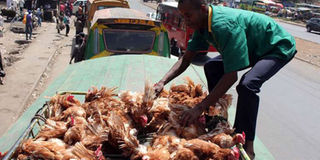Kenya temporarily bans importation of chicken and poultry products from Uganda

A man removes chickens from a bus in Kenya on December 31, 2016. PHOTO | DENNIS ONSONGO | NATION MEDIA GROUP
What you need to know:
As a result, health and veterinary officers at border points have been directed to ensure that the chicken and products are not allowed into the country until the situation in Uganda normalises.
Speaking to Nation, director of veterinary services, Dr Juma Ngeiywa, said the ban was informed by the need for the country to remain on high alert after the deadly disease, known as avian influenza, was detected in dead birds in Uganda at the weekend.
The importation of chicken and poultry products from Uganda has been banned temporarily following an outbreak of bird flu.
As a result, health and veterinary officers at border points have been directed to ensure that the chicken and products are not allowed into the country until the situation in Uganda normalises.
Speaking to Nation, director of veterinary services, Dr Juma Ngeiywa, said the ban was informed by the need for the country to remain on high alert after the deadly disease, known as avian influenza, was detected in dead birds in Uganda at the weekend.
“Until the situation stabilises and the country is able to prove that the disease is no longer circulating, we will not allow any of their poultry products into the country,” said Dr Ngeiywa.
Surveillance has been beefed up and a team of experts sent to all the border points to monitor the situation, he added.
“We have alerted our teams all the way in Homa Bay to Lodwar to be on the lookout,” said the director.
The public has also been advised to report any cases of mass deaths of wild or domestic animals.
Head of the Kenya Veterinary Association Samuel Kahariri, further told the public to avoid touching or eating the birds or animals found dead and instead “report to the nearest veterinary authority”.
Uganda’s ministry for agriculture detected the Highly Pathogenic Avian Influenza, which infects both animals and humans, following tests on carcasses of white winged-black tern birds (migratory birds) that died on the shores of Lake Victoria at Lutembe beach on January 2, prompting the activation of its disease prevention strategy.
EAST AFRICA
The disease, being detected for the first time in an East African country, could have been brought into Uganda by the migratory birds that fly in from Europe during winter to breeding grounds on the shores of Lake Victoria. “The national government must come in strongly and put in a strong animal disease surveillance system particularly in the hotspots,” said Dr Kahariri.
On Monday, the Health ministry announced that an “outbreak preparedness task force” had been activated following a confirmed outbreak of the disease in Uganda after confirming the flu through multiple tests at both agricultural and human health laboratories.
According to a source at the ministry, who asked to remain anonymous as the official is not authorised to speak to the media, the ministry has already received a situation report that it was waiting for from Uganda and is preparing for a joint task force meeting that will be held on Wednesday.
Kenya can detect and confirm the infection through the National Influenza Sentinel laboratory in Nairobi.
According to the Centres for Disease Control and Prevention, avian influenza is a disease caused by infection with avian (bird) influenza (flu) Type A viruses. These viruses occur naturally among wild aquatic birds worldwide and can infect domestic poultry and other bird and animal species.
Although bird flu viruses do not normally infect humans, sporadic human infections can occur.




